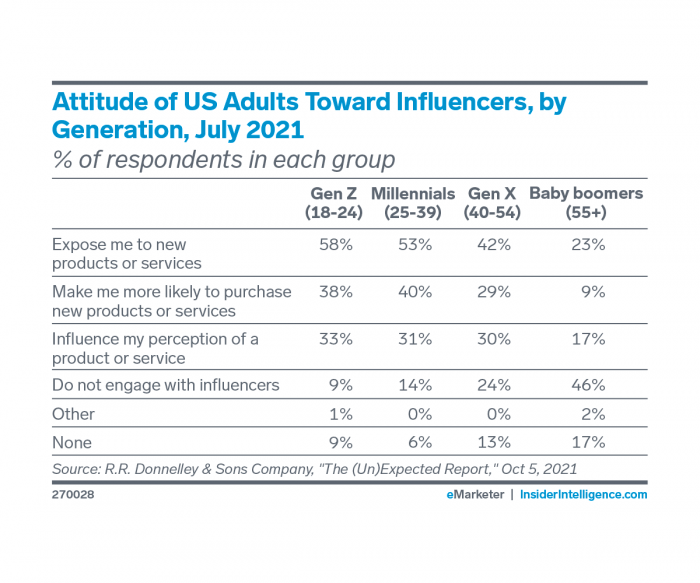Marketers spent a whopping $13.8 billion on influencer marketing in 2021. That’s a 42% increase over 2020. However, as a B2B marketer, you might assume influencer marketing doesn’t apply to your industry. You’d be wrong.
If you spend any time on a platform like Instagram, you’ve seen lifestyle influencers. They promote everything from beauty products and mattresses to toothbrushes and protein powders. And if that’s all you’ve seen, it’s not a surprise that you think influencer marketing won’t work for your B2B product or service.
But that’s not the kind of influencer marketing we’re talking about. As a B2B marketer, you have an opportunity to tell the story of your organization through influencers in a slightly different way.
Influencer marketing perceptions
If we look at generational attitudes toward influencers—noted in the chart below—we notice that Gen Z and millennials are more likely to purchase new products or services because of an influencer. However, Gen Z, millennials, and Gen X say their perceptions of a product or service are equally impacted by influencers.

With millennials responsible for at least 73% of today’s B2B purchases, companies need to connect with these younger decision-makers through innovative strategies. Millennials don’t want hard sales pitches and big promises; instead, they care about a company’s environmental impact and company culture. They want to see these things communicated on platforms like social media.
80% of millennial B2B buyers list social media as a factor in influencing their purchasing decisions.
Forbes, 2021
Worldwide, B2B marketers say the benefits of influencer marketing include increases in:
- Social reach
- Credibility of brand content
- Share of voice
- Media mentions of brand
- New leads
- Brand advocacy
- Sales
Most likely, your business goals are represented in those bullet points above. Which means influencer marketing is—in fact—for you, too.
Building an influencer marketing strategy
First and foremost, your influencer campaigns should not operate independently of your other digital marketing efforts. Success won’t happen in a silo.
Influencer marketing should be included as part of your overall marketing mix. It should support what you’re doing on your website and organic social media channels and in your digital advertising.
Identify potential influencers.
The right influencers for your organization aren’t just on Instagram with hundreds of thousands of followers. Sure, that may be part of it, but industry and business influencers are increasingly sought by brands based on their credibility, trust, and status.
B2B influencers can take several forms, including:
- LinkedIn thought leaders
- Partnerships with industry and news publications
- Business executives and journalists on Twitter
- Podcast hosts
Influencers may already be within your customer base. They are likely in roles of influence, making key decisions, and trusted not only by their company but by others within their industry.
Creating content partnerships with these individuals is mutually beneficial. It creates brand awareness for you and publicity and reach for them.
Start with LinkedIn.
For some, LinkedIn is still the place they go to scroll job postings and network for the purpose of finding work. But LinkedIn has become so much more than that. It’s the Instagram of B2B.
Co-founder and SEO of SocialPubli, an influencer marketing platform, described in Forbes that, “LinkedIn has seen a new category of influencer emerge—more executives, CEOs, and business owners—and is building tools to support them accordingly.”
There’s no shortage of individuals who could partner with your organization as a LinkedIn influencer. And it shouldn’t be a one-sided partnership. Cross-promote each other and build off the conversations that are created.
From there, an influencer can promote your organization through long-form content, video, and podcast interviews on shows your audience is interested in.
Tell the right story.
There are obviously clear messages and differentiators you want influencers to communicate, but the key is allowing them to do it in their own way.
People trust influencers who are authentic. Let them talk about their own struggles and how your product or service helped.
Don’t force them to regurgitate marketing jargon. Their audience won’t like it and may subconsciously connect your product to those negative feelings.
When influencers are empowered to talk about their life, their passions, and their successes in association with you, the story is much more powerful. The impact your organization has become real, not just theoretical.
Get others talking about you.
The whole point of influencer marketing is to get other people talking about your organization. If you’re lucky, people will do that without you even asking. But, in reality, incentives are often needed to encourage people.
Based on an influencer’s status or follower count, those incentives may look different. They can range from cash incentives, product/service incentives, or just the increased publicity your marketing campaign brings to their online brand.
Some celebrity influencers have been known to provide influential content for a donation made to an aligned non-profit or cause.
Your current customers can also act as influencers through brand ambassador programs. Regardless of the specific terms and expectations in a brand ambassador program, the idea is to provide customers with an incentive to regularly promote your brand.
Over time, as more influencers are online talking about your brand, you’ll see an influx of customers and potential influencers reach out to you instead of the other way around.
Find a marketing agency partner that thinks beyond the ordinary.
Make sure your marketing team or agency partner is helping you think beyond the typical media and digital campaigns. For B2B organizations, there are so many unique ways to incorporate influencers into your marketing to help bring more customers to you.
You want a partner who thinks smarter about these unique placements and opportunities. Like we mentioned before, content generated from influencer marketing should extend well beyond a campaign. In that way, you’re optimizing your investment over time.
